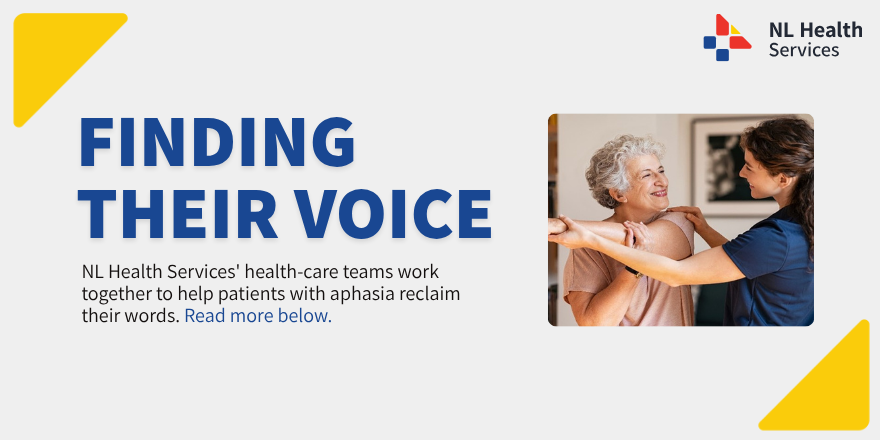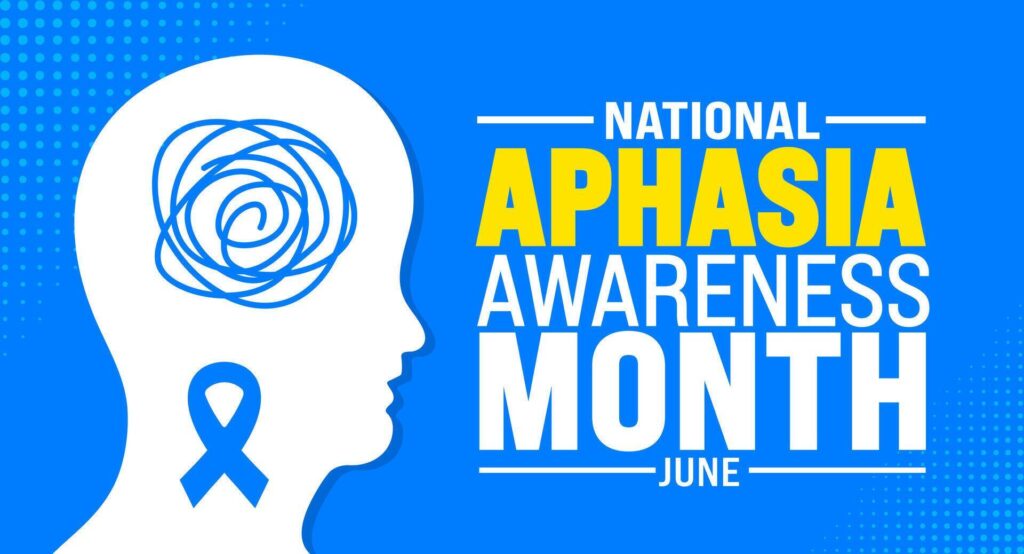Copy link URL:
Stories
Finding their voice: How collaboration across NL Health Services supports aphasia recovery and wellness
June 30, 2025
At the heart of every recovery story lies connections, a voice reclaimed, a step regained, a life reimagined. For individuals living with aphasia in Newfoundland and Labrador, that connection begins with a team of health-care professionals who see not just the disorder, but the person behind it.
Aphasia is a language disorder that can suddenly and dramatically impact a person’s ability to speak, understand, read and write. Often caused by stroke or brain injury, it turns everyday communication into a frustrating challenge. But recovery is possible, and within NL Health Services, teams of professionals are working together to make that recovery meaningful.
One powerful example is Supported Conversation for Adults with Aphasia (SCA™), a training program developed by the Aphasia Institute in Toronto and delivered being introduced in Newfoundland and Labrador. SCA™ teaches health-care staff simple, practical strategies to improve communication with people who have aphasia—strategies that empower patients to express themselves and participate fully in their care.
“The SCA™ training taught me a greater understanding and gave me additional skills to improve my ability to communicate effectively with patients with aphasia,” said Aimee Roestenberg, a clinical physiotherapist who completed the training. “This kind of education goes beyond tools, it builds empathy, confidence and stronger therapeutic relationships.”
This work is being implemented through NL Health Services’ Communication Access Initiative at the Dr. L.A. Miller Centre in St. John’s, a rehabilitation facility serving patients from across the province. Through this initiative, more staff have been trained in SCA™, and the impact is being felt. Therapists report greater confidence in supporting patients with communication challenges, and patients are showing increased engagement in their therapy and care planning.
“Patients and families have noticed the difference that this staff training initiative has made,” said Alyson King, a speech-language pathologist involved in the program. “They report that they feel included and able to participate and engage with their team. The Aphasia Institute says: ‘life is a conversation,’ and this is so true and becomes so apparent for those who have aphasia; it’s not just about language or our professional roles, it’s about promoting inclusion and connection. In our roles as health-care professionals, doing everything we can to ensure that people are able to participate in their own health-care conversations is crucial to providing patient-centred care.”
But language isn’t the only focus.
At the Dr. L.A. Miller Centre, speech language pathologists and physiotherapists often co-treat patients, blending their skills to address both communication and mobility, because in real life, these functions go together. A co-treatment session might include balance work with the physiotherapist while the speech language pathologist guides the patient through verbal tasks like counting or recalling the days of the week. The result is a more natural, integrated therapy experience that supports overall recovery.

This collaboration reflects a deeper truth: recovery involves both the body and the mind. Whether it’s walking, talking, or rejoining daily life, patients benefit most when their care team is working together. And at Dr. L.A. Miller Centre, that’s exactly what’s happening.
“As a speech language pathologist working in an outpatient service, more aphasia patients are coming to me having been exposed to SCA™ and families have a greater understanding of how to communicate with their loved ones with aphasia,” says Elise Murphy-Dowden, speech-language pathologist. “In the past, patients often came to my service with no exposure to SCA™. This notable difference is having a positive impact on patient care.”
From the earliest days of rehabilitation to the moment a patient returns home, these therapists are walking alongside individuals with aphasia, supporting not just recovery, but reintegration. Through shared care planning, co-treatments, and continued communication training for staff, care teams at NL Health Services are changing what recovery looks like.
And what makes these efforts remarkable isn’t just the clinical knowledge or innovation, it’s the human connection. Aphasia may affect language, but it does not take away a person’s thoughts, feelings, or desire to be heard. Thanks to the compassion and collaboration of these teams, more patients are finding their voices—and themselves—again.
“SCA™ training has changed the way I can interact with my patients,” says Mary Rogers, clinical physiotherapist. “I feel like we can communicate much more effectively.”
Here in Newfoundland and Labrador, recovery is personal. And within NL Health Services, speech-language pathologists and physiotherapists are truly moving communities one word, one step, and one story at a time.
June is National Aphasia Awareness Month. To learn more about aphasia, please visit the Aphasia Institute webpage.
For local resources available to you and your loved ones, please visit https://www.heartandstroke.ca/services-and-resources/aphasia-services.

___
This story was written by Jon Oake, a communications officer with NL Health Services. Based in Grand-Falls Windsor.
